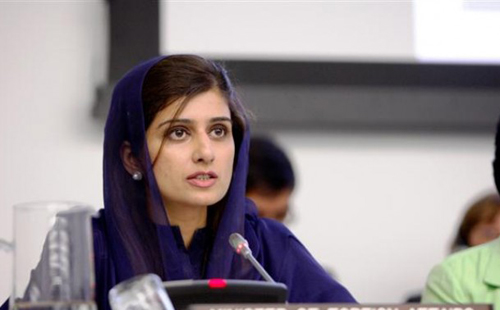Pakistani Foreign Minister Hina Rabbani Khar
أجرى الرئيس محمد مرسي اليوم الأربعاء مباحثات مع وزيرة الخارجية الباكستانية حنه رباني كهار في مقر الرئاسة في مستهل زيارة تقوم بها لمصر وتستغرق ثلاثة أيام.
وصرح المتحدث الرسمي باسم الرئاسة ياسر علي عقب اللقاء أن :"الوزيرة الباكستانية سلمت مرسي دعوة من نظيره الباكستاني آصف على زرداري لحضور قمة الدول الثماني الإسلامية المقررة في إسلام أباد من 19 إلى 21 نوفمبر المقبل".
وأشار علي إلى أن:" مرسي لم يحدد موقفه من الدعوة بعد"، مضيفا أن:" اللقاء تطرق أيضا للأزمة السورية وضرورة وضع حد للعنف هناك بالإضافة للقضية الفلسطينية".
ومجموعة الدول الثماني الإسلامية النامية هي منظمة دولية تضم ثماني دول إسلامية هي تركيا ومصر وباكستان ونيجيريا وإيران وإندونيسيا وماليزيا وبنجلادش، ويبلغ عدد سكان دول المنظمة مليار نسمة أي ما يوازي 14% من سكان العالم.
تأسست المنظمة في تركيا عام 1997 وتهدف لتدعيم العلاقات الاقتصادية والاجتماعية بين الدول المنظمة.
على صعيد متصل، أجرت "رباني" عقب لقائها ومرسي، مباحثات في مقر الخارجية مع نظيرها محمد كامل عمرو، كما التقت أيضا والأمين اللعام لجامعة الدول العربية نبيل العربي لمناقشة المواقف المشتركة إزاء القضايا الإقليمية والدولية على الساحة العربية، بحسب مصادر بالجامعة العربية.
وأشار علي إلى أن:" مرسي لم يحدد موقفه من الدعوة بعد"، مضيفا أن:" اللقاء تطرق أيضا للأزمة السورية وضرورة وضع حد للعنف هناك بالإضافة للقضية الفلسطينية".
ومجموعة الدول الثماني الإسلامية النامية هي منظمة دولية تضم ثماني دول إسلامية هي تركيا ومصر وباكستان ونيجيريا وإيران وإندونيسيا وماليزيا وبنجلادش، ويبلغ عدد سكان دول المنظمة مليار نسمة أي ما يوازي 14% من سكان العالم.
تأسست المنظمة في تركيا عام 1997 وتهدف لتدعيم العلاقات الاقتصادية والاجتماعية بين الدول المنظمة.
على صعيد متصل، أجرت "رباني" عقب لقائها ومرسي، مباحثات في مقر الخارجية مع نظيرها محمد كامل عمرو، كما التقت أيضا والأمين اللعام لجامعة الدول العربية نبيل العربي لمناقشة المواقف المشتركة إزاء القضايا الإقليمية والدولية على الساحة العربية، بحسب مصادر بالجامعة العربية.
الصحف الباكستانية من جهتها تناقلت خبر زيارة الوزيرة لمصر وعلقت صحيفة Dawn أو "الفجر" على لقاءاتها بالقاهرة، حيث اعتبرت أنها تهدف إلى تعزيز العلاقات بين البلدين الإسلاميين، وبحث التعاون في المجالات المختلفة
أما عن اجتماعها المرتقب بالرئيس المصري محمد مرسي فوصفته بأنه سيكون بمثابة الخطوات الأولى لـ"إسلام اباد" نحو تأسيس "روابط ثنائية مع النظام المصري الجديد".
Keen to defend the country’s record because of candidacy for the Nov 12 election to HRC and hopes of qualifying for next GSP+ preferential trade programme, Foreign Minister Hina Rabbani Khar herself led the delegation to the Universal Periodic Review (UPR) in Geneva.
UPR is a state-driven process in which every UN member country gets a chance to make a presentation at the council about steps it had taken to address rights violations and fulfil its obligations. Currently the second round of the review, which started in May this year, is under way. The UPR has been heralded as an unmatched international mechanism to monitor rights situation across the world.
Ms Khar based the country’s HR case on a legislation enacted for protection of rights including establishment of National Commission for Human Rights; constitutional reforms; ratification of international HR treaties; visit of the UN High Commissioner for Human Rights and a number of ‘special procedures’ – Rapporteur on Independence of Judges and Lawyers and Working Group on Enforced Disappearances.
The delegation did take pride in having a vibrant civil society and media and strengthening democracy in the country.
But what the foreign minister either fleetingly addressed or completely ignored – missing persons; blasphemy laws; continued killing of Shias; plight of religious minorities; maltreatment of women; abuses during counter-militancy operations by the military and situation in Balochistan.
The foreign minister spoke about growing extremism and terrorism in the country as a major challenge to national security, attributed it to CIA-sponsored jihad against the Soviet Union, but didn’t have an inspiring story about how the government was addressing the critical issue other than military-run ‘Sabaoon Project’ in Swat.
National outpouring of sympathy for Malala Yousufzai was showcased by the minister as a reflection of the national resolve against terrorism, little remembering that the country even then failed to develop national consensus on taking on the militants.Ms Khar’s description of the situation gave an impression that the terrorists had an upper hand in the fight against terrorism in which 40,000 innocent Pakistani lives have been lost, while the loss to economy has been valued at $70 billion.
“Extremists have targeted hospitals, schools, shrines, mosques, and other places of worship. This has created an environment of intimidation for law-enforcement officials, members of judiciary, members of the media and civil society activists,” the foreign minister noted.


Comments
Post a Comment